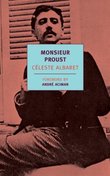Books |
Monsieur Proust
Celeste Albaret
By
Published: Feb 28, 2023
Category:
Memoir
All writers who have seen their masterpieces rejected by publishers delight in the fact that “Du côté de chez Swann” was rejected by several publishers and that Andre Gide returned his manuscript unread. Odds are good that you haven’t read it either. But reading about Proust? An accessible delight. And a brilliant film about Proust and the essential woman in his life? Equally remarkable — even if it happens to be in German. Seriously, “Celeste” is on my all time Top Ten list. For the preview, click here. To stream the film from Amazon Prime, with English subtitles, click here.
What a love story!
In 1913, Marcel Proust’s driver, Odilon Albaret, married a young woman from a small mountain village. Celeste knew no one in Paris, and her loneliness mounted. Proust suggested that she deliver copies of his new book to friends.
And so it began.
Messenger, housekeeper, confidante, friend, nurse — until his death in 1922, Celeste Albaret spent more time with Proust than anyone else. Indeed, she spent much more time at Proust’s home than she did in her own. As her memoir attests, she begrudged not a minute of those hours in his service.
Early on, she left Proust’s apartment to go to church. “There will be plenty of time for that after I’m dead,” he said. She never went to church again while he was alive. Proust — the man and the writer — came first. “Time contained no hours,” she writes, “just a certain number of definite things to be done every day.” And yet, no matter how exacting his demands, she never entered his room without a smile.
Proust, as you know, had an upside-down schedule. He awoke in an unheated, cork-lined bedroom around four in the afternoon, burned a special powder to hold his asthma at bay, then rang for coffee. In the evening, he might go out; if he did, he gave Celeste a full report on his return. And then his writing day began…..
In 1914, Proust saw Death ahead, and he decided that he had to suspend all travel and almost all socializing in order to focus on his book. With that, Celeste moved from the background of his life into sharp focus. Not only did she bring him coffee and tend to the smallest details of his life — and Proust was a notorious micro-manager — she got the big picture, and fast:
M. Proust’s whole object, his whole great sacrifice for his work, was to set himself outside time in order to rediscover it. When there is no more time, there is silence. He needed that silence in order to hear only the voices he wanted to hear, the voices that are in his books. I didn’t think about that at the time. But now when I’m alone at night and can’t sleep, I seem to see him as he surely must have been in his room after I had left him — alone too, but in his own night, working at his notebooks when, outside, the sun had long been up.
Proust liked to try out material on Celeste, and when he’d come home from a night in Society, he’d often tell her stories until dawn. These included astute descriptions of social figures. Even better, Proust made universal observations. “This is often why people are so nasty,” he told Celeste. “They cannot forgive others for not being as ugly as themselves.” On never going back to his childhood home: “The only place where you can regain lost paradises is in yourself.” On rising in Society: “The main thing is to gain admission. After that it just builds up on its own.”
“I was the privileged spectator,” she writes, “of the most beautiful theater in the world.”
And the most privileged assistant. It was Celeste who pasted Proust’s scraps of paper — his afterthoughts — into the manuscript. [To buy the paperback of “Monsieur Proust” from Amazon, click here.]
For all their intimacy, the relationship was always formal:
“Monsieur, why don’t you call me ‘Celeste’? It makes me self-conscious when you call me ‘madame.’”
“Because, madame, I cannot.”
That was that.
And yet, he admitted, “The only person I could have married is you.” (In these pages, Proust is not a homosexual — I like to think Celeste knew otherwise, but was a model of discretion. Which is entirely possible; she and her husband never gossiped about their employer. )
In every other way, this is a book of close observation, of details that, taken together, reveal character. Proust’s insistence on old handkerchiefs. He brushed his teeth obsessively, but never washed with soap. He liked an occasional beer — if brought to him from the Ritz. He wore cheap watches. He told Odilon not to buy a new taxi: “I don’t want people to notice me as I go by.”
In his last years, Proust compared the value of his book to one Celeste might write. “When I am dead, your diary would sell more copies than my books,” he said. Yes, if she had published it right away. But she waited 60 years. That is love.


